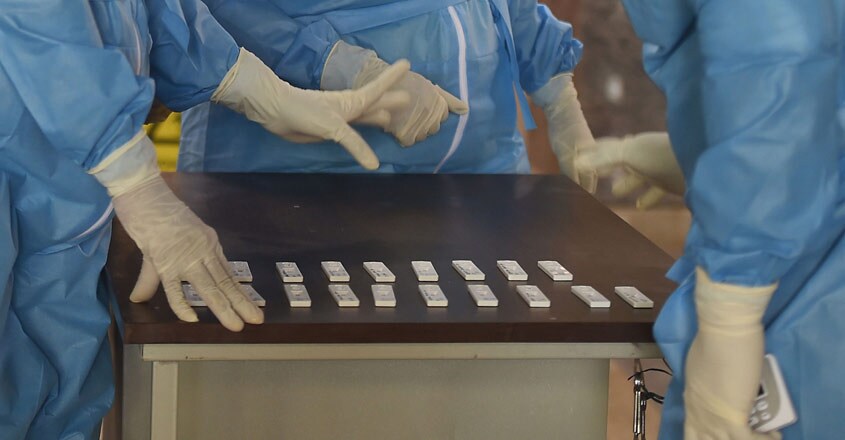COVID-19: Rapid test kits arrive, Kerala about to begin next level of virus containment

Mail This Article
Now that the 'airport to house to neighbourhood' surveillance strategy has largely been successful, Kerala is all set to begin the next level of COVID-19 containment.
Called 'street surveillance', it would search for the prevalence of the virus in areas that were all this while out of Kerala's COVID-19 surveillance network.
Until now, only those who had come from outside - foreign returnees and those from other states - and their immediate contacts (mostly close family members and neighbours) were either quarantined or isolated in hospitals, and tested.
This strategy was adopted on the firm conviction, which still holds, that the virus was brought in by those travelling from outside the country.
So, along with the returnees, their immediate contacts and those who could have been possibly infected by these immediate contacts were the only ones put under strict surveillance. By April 4, there were more than 1.7 lakh people under surveillance (either in home quarantine or isolated in hospitals) across Kerala.

Then there was a slowdown in the growth of new COVID-19 cases, and now it looks as if the disease progression has got stuck in marshy land; in the last four days the number of fresh cases were 1, 7, 1 and 4.
As things got better, the Health Department began to prioritise a concern that had always loomed over the containment measures like a frightening shadow. The likelihood that the virus would have quite furtively spread out of the foreign returnee's neighbourhood and crossed into the street. Before claiming absolute freedom from the virus, Kerala has to first be certain that the virus is not stealthily stalking the streets.
Antibody tests vs RT-PCR
In fact, this should have been done long before. Kerala had even placed an order for nearly two lakh rapid antibody test kits with China during the last week of March. But it was only on April 18 that the first batch of 20,000-odd kits had arrived in Kerala.
The antibody tests are different from the definitive RT-PCR (Reverse Transcription-Polymerase Chain Reaction) tests that Kerala is doing daily on the throat and serum samples collected from those under surveillance. The rapid tests look only for antibodies, the immunoglobulins produced by the body to fight the virus. The RT-PCR tests, on the other hand, look for the antigen, the virus.
The presence of antibodies in a blood sample is a sign that the person was infected. The advantage of a rapid test is that it is fast and, being cost-effective, could be done on an extensive group of people. More than 10,000 tests could be done in a single day.
The immediate plan is to test 415 people each in all the 14 districts. On whom the rapid kits should be deployed first has not yet been decided. Should it be on people with severe acute respiratory illness (SARI) and those who had come out of SARI without any diagnosis or asymptomatic people who could have possibly come in touch with people who had turned positive?
It is felt that the first group, SARI patients, could be masked Sars-CoV-2 carriers. The second group is also important as it is now recognised that there is a sizeable chunk of asymptomatic patients who are highly infective. Many who had tested positive after April 7 have been asymptomatic.
However, the blood samples of front line health workers will anyway be subjected to rapid tests. Doctors, nurses and other paramedical staff now work in three shifts, and follow a 14-day rotation policy (after 14 days of duty they quarantine themselves for 14 days.) They have also been advised to take hydroxychloroquine tablets to keep the virus at bay.
Despite all the precautions, some health workers, including a doctor, had tested positive. So, it has been decided to conduct antibody tests on all health workers.


